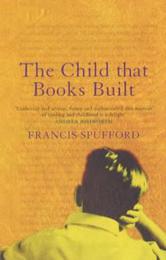
|
The Child that Books Built
Paperback / softback
Main Details
| Title |
The Child that Books Built
|
| Authors and Contributors |
By (author) Francis Spufford
|
| Physical Properties |
| Format:Paperback / softback | | Pages:224 | | Dimensions(mm): Height 198,Width 128 |
|
| Category/Genre | Biographies:General
Children's literature studies - general |
|---|
| ISBN/Barcode |
9780571214679
|
| Classifications | Dewey:002.092 |
|---|
| Audience | |
|---|
| Edition |
Main
|
|
Publishing Details |
| Publisher |
Faber & Faber
|
| Imprint |
Faber & Faber
|
| Publication Date |
17 March 2003 |
| Publication Country |
United Kingdom
|
Description
What would you find if you went back and reread all of your favourite books from childhood? Francis Spufford discovers both delight and sadness, in this memoir. Re-reading and re-living these books, and investigating their literary origins and rich histories, Francis Spufford reveals what it was like to be an obsessive reader as a child. As the book unfolds, so too he gradually uncovers his own childhood and his unique reason for taking refuge in stories from a world full of unbearable knowledge.
Author Biography
Francis Spufford, a former Sunday Times Young Writer of the Year (1977), has edited two acclaimed literary anthologies and a collection of essays on the history of technology. His first book, I May Be Some Time: Ice and the English Imagination, was awarded the Writers Guild Award for Best Non-Fiction Book of 1996 and a Somerset Maugham Award, and also inspired a Frankfurt Ballet production and a clown show at the Edinburgh Festival 2001. He lives in Camberwell, London.
Reviews"Exhilarating. . .It's a brilliant book, beautifully written, its insights hard-earned, filled with stuff that will make you understand a whole lot better your own life in reading." --"The New York Times Book Review" "Ambitious. . .His enthusiasm for this material is often charming. . .Spufford is at his best recalling his bookish discoveries." --"Newsday "(New York) "Francis Spufford lures us in to reveal the original power of books--as landscapes, as spurs to inwardness, as the very crucibles in which the self is formed. He is the addict's unrepentant confession, poignant, witty, and true in the way that every real reader will recognize instantly." --Sven Birkerts, author of "The Gutenberg Elegies"
|